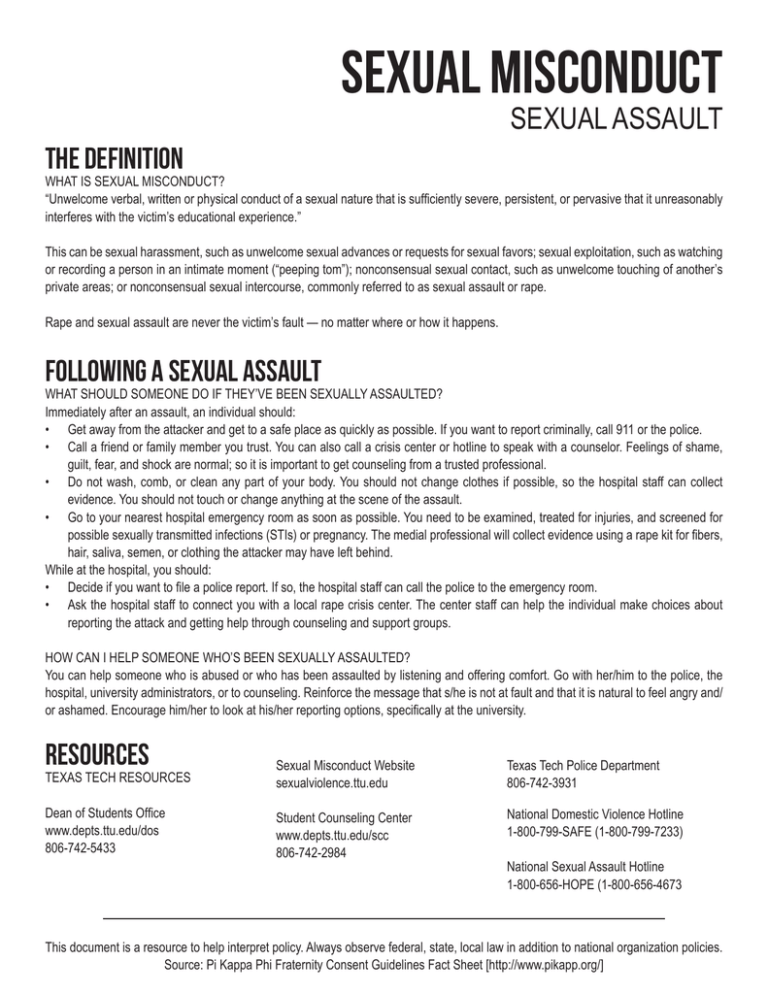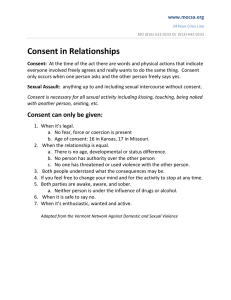
Sexual Misconduct
SEXUAL ASSAULT
The Definition
WHAT IS SEXUAL MISCONDUCT?
“Unwelcome verbal, written or physical conduct of a sexual nature that is sufficiently severe, persistent, or pervasive that it unreasonably
interferes with the victim’s educational experience.”
This can be sexual harassment, such as unwelcome sexual advances or requests for sexual favors; sexual exploitation, such as watching
or recording a person in an intimate moment (“peeping tom”); nonconsensual sexual contact, such as unwelcome touching of another’s
private areas; or nonconsensual sexual intercourse, commonly referred to as sexual assault or rape.
Rape and sexual assault are never the victim’s fault — no matter where or how it happens.
Following a Sexual Assault
WHAT SHOULD SOMEONE DO IF THEY’VE BEEN SEXUALLY ASSAULTED?
Immediately after an assault, an individual should:
• Get away from the attacker and get to a safe place as quickly as possible. If you want to report criminally, call 911 or the police.
• Call a friend or family member you trust. You can also call a crisis center or hotline to speak with a counselor. Feelings of shame,
guilt, fear, and shock are normal; so it is important to get counseling from a trusted professional.
• Do not wash, comb, or clean any part of your body. You should not change clothes if possible, so the hospital staff can collect
evidence. You should not touch or change anything at the scene of the assault.
• Go to your nearest hospital emergency room as soon as possible. You need to be examined, treated for injuries, and screened for
possible sexually transmitted infections (STIs) or pregnancy. The medial professional will collect evidence using a rape kit for fibers,
hair, saliva, semen, or clothing the attacker may have left behind.
While at the hospital, you should:
• Decide if you want to file a police report. If so, the hospital staff can call the police to the emergency room.
• Ask the hospital staff to connect you with a local rape crisis center. The center staff can help the individual make choices about
reporting the attack and getting help through counseling and support groups.
HOW CAN I HELP SOMEONE WHO’S BEEN SEXUALLY ASSAULTED?
You can help someone who is abused or who has been assaulted by listening and offering comfort. Go with her/him to the police, the
hospital, university administrators, or to counseling. Reinforce the message that s/he is not at fault and that it is natural to feel angry and/
or ashamed. Encourage him/her to look at his/her reporting options, specifically at the university.
Resources
TEXAS TECH RESOURCES
Sexual Misconduct Website
sexualviolence.ttu.edu
Texas Tech Police Department
806-742-3931
Dean of Students Office
www.depts.ttu.edu/dos
806-742-5433
Student Counseling Center
www.depts.ttu.edu/scc
806-742-2984
National Domestic Violence Hotline
1-800-799-SAFE (1-800-799-7233)
National Sexual Assault Hotline
1-800-656-HOPE (1-800-656-4673
This document is a resource to help interpret policy. Always observe federal, state, local law in addition to national organization policies.
Source: Pi Kappa Phi Fraternity Consent Guidelines Fact Sheet [http://www.pikapp.org/]
Sexual Misconduct
CONSENT
Safe & Healthy Choices
This is NOT a manual for proper sexual conduct, but rather a series of guidelines to help you and your partner make safe and healthy
choices. Remember, sexual interactions should always occur between two CONSENTING adults.
Consent: “Mutually understandable words or actions, actively communicated both knowingly and voluntarily,that clearly convey permission
for a specific activity.”
•
•
•
•
TALK! Ongoing conversation is an important vehicle for consent. Stating your own desires doesn’t ensure consent. Both parties
should clearly and unambiguously express consent.
CLARIFY: When in doubt, find out! Don’t be afraid to ask questions if anything is unclear. The responsibility for obtaining consent
lies with the person initiating the sexual act. Avoid ambiguity; be verbal. Without verbal conversation, mutual agreement and
understanding is difficult, if not impossible, to reach.
ON-GOING PROCESS: Consent should be understood as an on-going process rather than a one-time, one- conversation, open
door to any or all-sexual interactions. Be aware that consent for one act (such as kissing) does not automatically imply consent for
subsequent behaviors.
CHECK-IN: It’s okay to check in and see if everyone’s enjoying themselves. If you sense at any point that your partner is not fully
participating or not completely engaged in sexual behavior or has changed his/her mind, then ASK if s/he wants to stop. Mutuality ─
if you’ve changed your mind, say so.
Poor Practices
•
•
•
•
•
•
SILENCE: Silence and/or non-communication and/or relying on assumptions.
INTOXICATION: According to the laws of some jurisdictions, CONSENT CANNOT be given when any person is intoxicated (whether
by drugs or alcohol), unconscious, or asleep.
VIOLENCE: The threat of or use of violence or force negates any previous consent or subsequent assumptions of consent.
COERCION: Like physical force, coercion and intimidation negate consent. (For instance, threatening to shame a person in front of
peers; or threats of outing).
DRUGS/ALCOHOL: Giving someone drugs or alcohol with the intent to impair his or her judgment or make them unconscious
violates the law.
HOOKING UP: The less you know the other person, the greater the risk for misunderstanding the wishes and intent of the other
person.
This document is a resource to help interpret policy. Always observe federal, state, local law in addition to national organization policies.
Source: Pi Kappa Phi Fraternity Consent Guidelines Fact Sheet [http://www.pikapp.org/]; The University of Chicago’s Resources for
Sexual Violence Prevention [http://rsvp.uchicago.edu]




